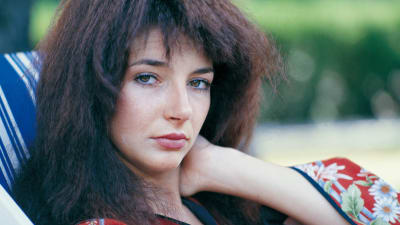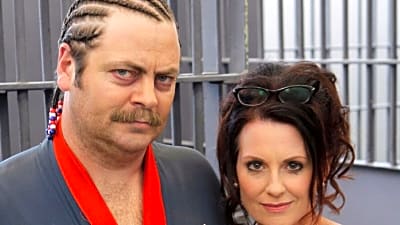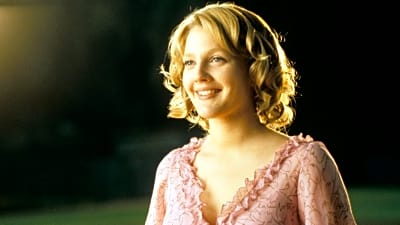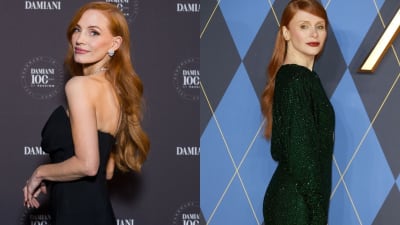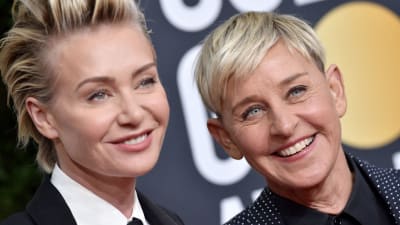EMEREE became an overnight star.
The Melbourne-Australia-based singer - whose real name is Gabrielle Emery - released her first single Leave You Like a Man on TikTok, and she shot to global fame after over a million people streamed the captivating tune.
She has also racked up 50 million Spotify streams and been named as one of NME'S top 100 artists to watch in 2025.
EMEREE - who is set to collaborate with Chic legend Nile Rodgers later this year - has released her sharpest single yet, Eyesore - a sugar-coated slice of Pop revenge wrapped in addictive R+B production, tongue-incheek lyrics, and vocals.
However, she had to release her "emotional clutter" from her "painful and life-altering" domestic violence experience on her recent single Spring Cleaning, which was tricky as she had never spoken publicly about it.
Contact Music sat down with EMEREE over the phone to talk about how she went from going viral on TikTok, to being named as NME'S top 100 artists to watch in 2025, how she released all her emotions from her domestic violence ordeal on her new single Spring Cleaning, and how she is excited to be working with a music legend...
CM: When did you start creating music?
E: I've always known that I wanted to be in music. From the age of four, I decided that I was going to be in music, and I have been writing songs since then. But I really got into production when I was at university, and then I fell in love with it, and I started producing for other artists. Then I randomly had a song that I hadn't even finished go viral on TikTok.
CM: What was it about music that inspired you to become a musician?
E: It's all I think about. I live, eat, breathe, sleep, music. There is never a time that I'm not thinking about creating music, and I just never get sick of it.
CM: Did it give you some escapism from the real world?
E: Absolutely. I also think it helps me to regulate my own emotions. It's helped me through all these experiences that I sing about because my brain can be quite scattered. It's a tool that I use to help me really understand what I'm going through, and the fact that I can then take that into something that becomes relatable for other people. It's just really, really cool.
CM: You mentioned there that you've had struggles in life, which you reflect on in your music. So has becoming a singer made your life that bit brighter?
E: Yeah, I definitely think so. Since that whole experience, I have got an amazing team around me now, but I still get to be independent, which means I just have so much control. But I have all the people who just really believe in me, which is incredible, and that's what you want. I feel so blessed to have that kind of support of just all these people just championing my art. I never take it for granted. Every single time one of them will do something for me, I'm like, 'Goodness, I just appreciate you.' That's just so special.
CM: Was it tricky building up relationships with record producers and fellow artists to gain that support in the first place?
E: Absolutely because I grew up in a small beach town, and there was no music scene there at all. My family will love music, but no one's from the industry. I really had to work it all out myself. And I'm lucky that I learned to produce at university, so I was doing everything myself for so long. And then I started producing and engineering for other artists. I would say even just in the last year, I've really got those connections now. And people seem to have me on their radar.
CM: Did fellow Australian singers, such as Kylie Minogue, Iggy Azalea and many others, inspire you to become a musician?
E: I wouldn't necessarily say the big Australian artists. Some of the music that I listened to was people who aren't necessarily quite as big, but their music found a fan base for themselves somehow, just because they've found a way to connect to people. And I think that's really cool. I think my ideal career would be like Mark Ronson, where you get to produce for all the artists, because I love producing so much, and it's so fun. But you also get to have your own project and get to be a little bit freer with it. You get to experiment more because you've got the production as well, so you can do the commercial hits with them. And then kind of focus on really exploring your own project.
CM: It's nice to do a bit of both, isn't it? I suppose it changes up the routine.
E: Yeah, it does. Getting to produce, you're working with someone else's vision. And there's just nothing more powerful than collaboration. And it's such a cool thing to get to be a part of someone's art.
CM: You've mentioned in the past that the type of music that's inspired you is 1950s and 1960s, soul and gospel. What is it about those genres from that time period that you fell in love with?
E: I just like how raw it is. I love the groove of that era of music, all the soul that is in it. I like how things aren't as clean. And that's something that I really try and reflect, even in my more modern productions, I really like to keep things a bit more raw, and I don't clean, quote, unquote up the mix as much, and I leave frequencies in that other people might take out because I want all that authenticity. And I really like to record real instruments in real rooms and really utilise the space that I'm in, because I think that's such a crucial part of those sorts of records; you can just feel that everyone was just in that room.
CM: Why do you think raw and clean music is more impactful?
E: I think it's more human. I think that people are starting because we've been fed so much overly clean and commercialised music, that pop is actually starting to get more creative and experimental, and people are doing different things.
CM: What do you think about the use of artificial intelligence (AI) in the creative arts industry?
E: I think it can make people lazy. I just don't think it should be used as a tool to help with the not very fun parts. Why are we using it for creative things and not things like frequency analysis. It seems to be people are using it more to make songs. And I'm like, give the AI the boring jobs!
CM: Have you ever tried using AI not necessarily to write songs, but just to, you know, just to see what it produces?
E: I've used it as an experiment, like a master, for example. I am very passionate about using real people. So I use a mastering engineer that I really love and trust, and I don't really like to just upload it to a website and have it spit out something. And I think it all goes back to that authenticity of it, doesn't it? If you write it yourself, it's coming from the heart. exactly. And I think it would be very difficult to train a robot to emulate your tone of voice. I have a very specific way that I like to be in my character of EMEREE, I guess. And I think it would feel very inauthentic if I were using a robot to say what I need to say.
CM: Some of your songs, including Spring Cleaning and Leave You Like a Man, their lyrics often explore the realms of sexual identity and female empowerment. Why did you decide to go for those topics?
E: I don't really think about it that much. I just write whatever comes out, and then the stuff that resonates with me the most is what I end up putting out. I try not to think about it too much, and I just write. I really just get into flow state, as they say, and I write whatever I need to write that day, and then if I really like it, great. But if I don't, then cool, I'll either edit it or it'll end up in the demos pile. I often write very introspectively, and I reflect a lot on the way that I am. I do think it's important to talk about those things, though, and I think there is still so much space, especially where I grew up, to work on building that awareness. So yeah, I would love to say it's because I have a big agenda and a grand master plan, but that's just my experience. It's just my lived experience, and that's made its way into my art.
CM: Is that something you've struggled with?
E: Yeah, absolutely. I pretty much only work with women, and that's not by choice. It's just because they're the only ones who will choose to hire, and a lot of the time, it's because they've had a bad experience with men, which is such a shame. A lot of the time, I've taught at universities, and pretty much most of my students have said I've been their first and only female lecturer, and things like that. And when I went to university, there were no female audio lecturers.
CM: Spring Cleaning's lyrics are incredibly powerful, and you address your domestic violence experience through that. How proud are you of the single?
E: It's been really good. I feel like I had to because in the lead up to it coming out, I was quite obviously vulnerable. I hadn't talked about these things publicly at all, and I've still kept a lot of the details very private, purely from a safety perspective. It was really special how many people reached out to me, and because it's such a common issue, people really resonated with it, and it's been really nice to see it received, especially on the other side of the world. And I love that it was co-written with three other women. It was such a special writing experience because I really hadn't been able to put my feelings into words in that kind of way. And these women really helped me. I was spilling everything out, and they were turning it into poetry. And I was like, 'Wow.'
CM: Why did you feel it was important to address your experience through Spring Cleaning?
E: I just want to get this f------ out of my head. And it's just about taking back the space in your brain that a traumatic experience like this takes up. It happens to be for domestic violence for me. When you go through something very traumatic, such as PTSD or anything like that, it just takes up such a huge space in your brain. And I was like, 'I'm just so sick of thinking about this person.' It's not about them anymore. It's actually about me, and that's what the whole song is really about.
CM: Was it difficult to share the story through the lyrics initially?
E: Absolutely. We wrote it and pretty much produced it. I made the beat, and we wrote it all in basically one day, and then I just had a little bit more work to do. It came together so quickly and so organically, but it was, it was amazing how we had a big whiteboard, and we just wrote all the things that I was saying down, and then the girls would be like, I feel you. And there were times when I literally would just burst into tears.
CM: Was it a cathartic release for you?
E: Absolutely. This song has healed me in a lot of ways.
CM: How has Spring Cleaning healed you?
E: I feel like I had a lot of even in the last, you know, the month that it's been out, I still feel like I can see now that, and I probably wasn't aware of it at the time, that I had a lot of shame around it, because that's a pretty common thing for like survivors of abuse to feel is a lot of shame and guilt around it. But now I feel like I have flipped the narrative a bit, because I have said it in a way where I'm like, 'OK, get out of my head,' rather than a, you know, even though you totally like release, whatever art works for you, but I'm really happy with myself that this release was not as much of a like a song, where I feel like I am the victim, but more that I'm taking control back. So I think it's really helped me, even just within myself.
CM: What kind of things did you experience to make you feel shame?
E: It's very complex the way that it all works. But I had a particular event that was like the the big blow up, I guess, and it was a very traumatic evening, but it's also with these things, a lot of the time, the way that abuses work is they manipulate the user, that you think it's your fault, and people don't like to talk about domestic violence, so you feel guilty that you're oversharing, or whatever.
CM: Following the release of Leave You Like a Man, you've amassed millions of views on social media. You've got a fast-growing fan base. How supportive are your fans?
E: It's pretty good. It's cool seeing the support from the people who are there, and realising that they are there no matter what, and they're actually just hanging around, and they're going to engage with everything.
CM: You've been named as one of the top 100 artists to watch in 2025 by NME. What does that mean to you?
E: Oh, that was crazy. The manager called me and then sent me the email. And I was like, 'I know NME. WHAT?' And then I looked at the other people on the list, and I was like, 'How did they even know that I existed?' It was just really crazy. I think that's been the craziest thing over the last year. Before, I was putting myself forward to get any opportunity, but now they're just coming to me, which is wild and amazing, and I'm grateful.
CM: Later on this year, you're collaborating with Chic legend Nile Rodgers. How did that come about?
E: My manager knows him. She emailed him, and then the next morning, she was like, 'Hey, I got Nile Rodgers' email. He wants to talk to you.' Now I have his number in my phone, and we text every few days.
CM: What do you text about?
E: Just about songs and when we're going to collaborate.
CM: What are some of your rituals before you perform?
E: My songs are very vocally intensive, so I take a lot of care of my voice, and I warm up. And I have a very distinctive EMEREE look. So it takes me a while to get all glammed up and into that '70s costume.
CM: What would you say your one long-term goal is for the rest of your music career?
E: I just want to be making music every day. That's really all I care about. As long as I can make music every day, and I can pay to have a roof over my head.
More must-reads:
- The most memorable movies and TV shows set in the 1980s
- Danny DeVito says they "had a ball" doing the 'It's Always Sunny in Philadelphia' and 'Golden Bachelor' crossover episode
Breaking News
Trending in Entertainment
Customize Your Newsletter
 +
+
Get the latest news and rumors, customized to your favorite sports and teams. Emailed daily. Always free!
